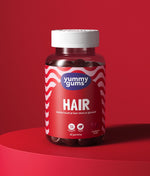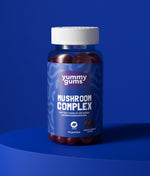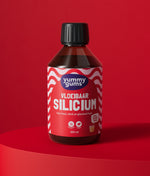Thinning hair and hair loss during menopause: what you can do
Lifestyle
Menopause is a phase in your life where your body leaves the fertile period behind. Hormonal balance changes, and your body must find a new balance. These changes affect many processes, including hair growth. During menopause, hair can become much thinner, drier, and duller, but why is this? In this blog post, you'll read all about the impact of menopause on your hair growth and what you can do about it.
What Happens to Your Hair During Menopause
During menopause, estrogen levels in your body are lower, which negatively impacts your hair growth. Hair follicles need estrogen to maintain hair production. In addition, testosterone levels rise, shortening your hair's growth phase. The extent to which this affects your hair varies from person to person.
Besides the changes in your hormone balance, there are other things that can affect your hair growth and health during menopause:Stress
We all know that stress is bad for your body. Unfortunately, this culprit also plays a major role in hair loss. The good news is that hair loss due to stress doesn't have to be permanent, so consider this a call to take some time to relax and de-stress!Underlying condition
Hair loss can also be a result of an underlying condition, such as thyroid problems. Did you know that hormonal changes can also affect your thyroid? It's always a good idea to consult your doctor if you have any doubts.
Vitamin deficiency
A vitamin-poor diet can have enormous consequences for your body. Therefore, supplementing with vitamin-rich foods can also have a significant impact on your hair growth. If, for some reason, you're unable to get all the nutrients you need through your diet, it's advisable to consider good supplements.
What can you do to prevent hair problems during menopause?
Good news, there's a lot you can do to give your hair extra support during menopause! Here's how to specifically combat problems like thinning hair and hair loss:
Good care: for scalp and hair
Over-styling your hair can make it dry and thin. By properly nourishing and caring for it, you can limit external damage. You can do this by massaging your scalp and using a nourishing shampoo and conditioner without perfume or silicone.
Lifestyle: Limit stress
As we mentioned above, stress isn't good for your hair. So try to avoid stress as much as possible by, for example, exercising more or finding a way to clear your head.
Nutrition: Vitamins and minerals
When we talk about caring for your hair, we're not just talking about the outside. You can also nourish your hair from within with the right vitamins and minerals. The following are essential:
- Vitamin B8 (biotin): Biotin is the most important vitamin for keeping your hair healthy. It promotes energy metabolism and supports the condition of your hair. This vitamin contributes to hair growth and keeps your hair strong.
- Zinc: Zinc contributes to hair growth and ensures strong, shiny hair. Strong hair is less likely to split and therefore stays beautiful longer. This mineral also supports your immune system.
- Selenium: Selenium is an important mineral for hair growth. This mineral protects your body's cells from external influences and is good for your hair. It also contributes to the maintenance of normal nails.
Yummygums Hair helps you on your way!
If you're looking to give your hair extra support from within, a hair supplement is a great option. Yummygums Hair is a sugar-free vitamin gummy with 11 vitamins and minerals, including a healthy dose of biotin, selenium, and bamboo extract. This way, you can optimally care for your hair while also enjoying a delicious raspberry flavor.


































